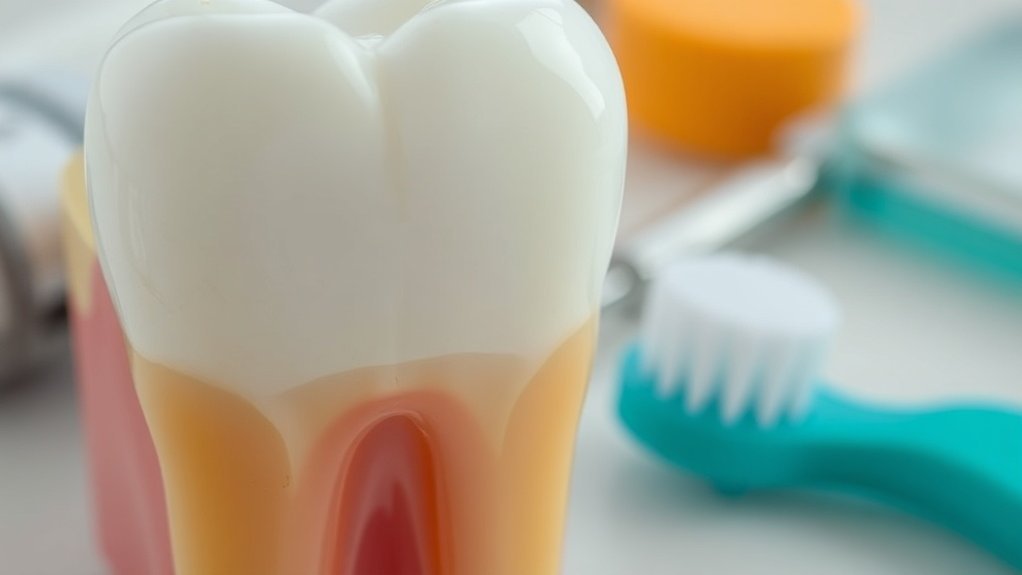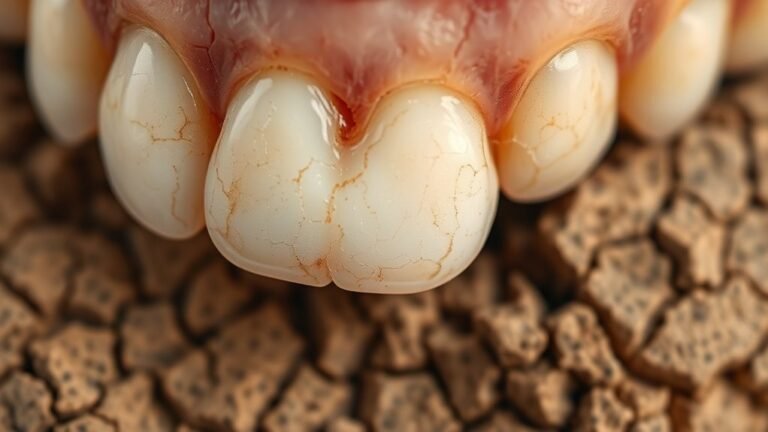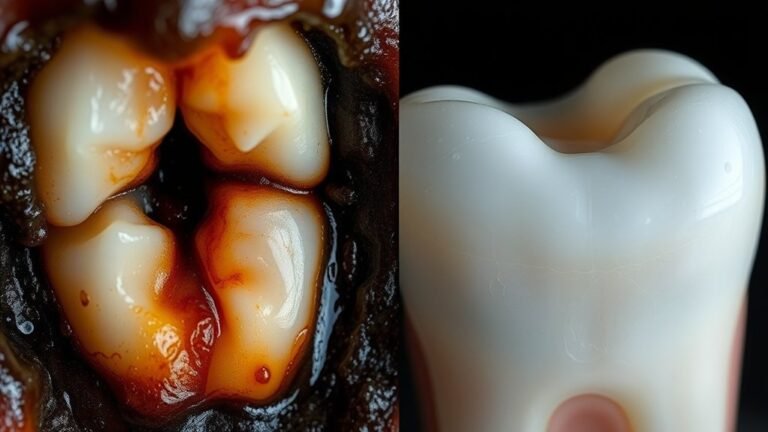Why Does Enamel Erosion Cause Tooth Sensitivity Despite Daily Brushing
Enamel erosion causes tooth sensitivity even with daily brushing because brushing alone can’t prevent damage from dietary acids, aggressive techniques, and inadequate saliva production. When enamel wears away, it exposes the underlying dentin and nerve endings, leading to discomfort from stimuli. Factors such as poor dietary choices and harsh brushing contribute to this issue. Understanding these elements is vital for maintaining dental health, and you’ll discover effective strategies to manage sensitivity and protect your enamel.
Key Takeaways
- Enamel erosion exposes dentin and nerve endings, leading to increased sensitivity when teeth encounter hot, cold, or sweet stimuli.
- Daily brushing may not prevent enamel erosion caused by dietary acids and poor oral hygiene practices.
- Aggressive brushing techniques can further contribute to enamel wear, despite regular brushing habits.
- Acidic foods and beverages can disrupt mouth pH, exacerbating enamel erosion and sensitivity issues.
- Using fluoride toothpaste and professional dental care are essential for strengthening enamel and managing sensitivity effectively.
Understanding Tooth Sensitivity
Tooth sensitivity occurs when the protective enamel wears down, exposing the underlying dentin and nerve endings. This enamel erosion can result from various factors, including aggressive brushing, acidic foods, and certain medical conditions. When the dentin becomes exposed, you may experience dentin hypersensitivity, where stimuli such as hot, cold, or sweet substances trigger pain or discomfort. This reaction happens because the nerve endings in the dentin are more susceptible without the enamel barrier. Maintaining good oral hygiene is vital, but it isn’t a complete safeguard against tooth sensitivity. You should also consider dietary choices and brushing techniques to minimize enamel erosion. By understanding tooth sensitivity, you can take steps to protect your teeth and maintain your comfort.
The Role of Enamel in Dental Health
Enamel serves as the first line of defense for your teeth, playing an essential role in maintaining dental health. This hard, protective layer, known as tooth enamel, shields the underlying dentin and pulp from harmful bacteria and acids. When you prioritize enamel protection through proper oral hygiene, you enhance your overall dental health. Daily brushing with fluoride toothpaste, along with regular dental check-ups, serves as effective dental health aids that help preserve enamel integrity. Additionally, a balanced diet low in sugars and acids can support enamel strength. Understanding the importance of tooth enamel not only helps prevent sensitivity but also contributes to long-term oral wellness, ensuring your smile remains healthy and resilient against challenges.
Common Causes of Enamel Erosion
While you may not realize it, various factors contribute to enamel erosion, impacting your dental health. One primary cause is acid erosion, which occurs when dietary acids from foods and beverages—like citrus fruits and soda—interact with your enamel. This constant exposure can lead to significant enamel wear. Additionally, conditions such as gastroesophageal reflux disease (GERD) introduce stomach acids into your mouth, further exacerbating enamel damage. Another contributing factor is mineral loss, often due to inadequate saliva production or poor oral hygiene. Saliva plays an essential role in neutralizing acids and replenishing minerals in your enamel. Understanding these causes is vital for protecting your teeth and maintaining long-term dental health.
How Brushing Can Contribute to Sensitivity
Your brushing technique plays an essential role in maintaining tooth sensitivity. Using hard bristles or brushing too aggressively can damage enamel and increase sensitivity over time. Additionally, overbrushing can lead to gum recession, further exposing sensitive tooth structures.
Brushing Technique Impact
Brushing technique plays an essential role in maintaining dental health, as improper methods can lead to increased tooth sensitivity. Your brushing habits directly influence enamel degradation, which is a primary factor in teeth sensitivity causes. If you brush too hard or use an aggressive technique, you risk wearing down the enamel faster, exposing the underlying dentin. This exposure can result in heightened sensitivity to temperature changes and certain foods. Additionally, neglecting to use a soft-bristled toothbrush can further contribute to enamel wear. By adopting a gentle, circular motion when brushing, you can effectively clean your teeth while minimizing damage. Paying attention to your technique not only safeguards your enamel but also helps reduce the risk of developing sensitivity over time.
Hard Bristles Damage
Regularly using a toothbrush with hard bristles can greatly contribute to enamel erosion and heightened tooth sensitivity. When you brush with hard bristles, you risk damaging your weakened enamel, which is essential for protecting your teeth. This erosion exposes the underlying dentin and nerve endings, leading to increased tooth pain and discomfort. While you may prioritize oral hygiene, the choice of brush matters considerably. Soft-bristled toothbrushes effectively remove plaque without causing additional damage to your enamel. If you experience sensitivity after brushing, it might be time to reconsider your brush type. Prioritize your dental health by selecting the right tools, ensuring that your oral hygiene routine doesn’t inadvertently contribute to further enamel wear and sensitivity issues.
Overbrushing Consequences
Overbrushing can exacerbate tooth sensitivity, compounding the damage caused by hard bristles. When you brush too aggressively, you risk gum recession and dentin exposure, which heightens sensitivity. This exposure occurs when the protective dental enamel wears away, leaving the sensitive layers of your teeth vulnerable. It’s vital to understand how your brushing habits impact your dental health.
| Consequence | Description |
|---|---|
| Dentin Exposure | Loss of enamel reveals sensitive dentin, increasing sensitivity. |
| Gum Recession | Aggressive brushing can lead to gum tissue loss, heightening discomfort. |
| Enamel Damage | Overbrushing erodes enamel, preventing natural dental enamel repair. |
| Sensitivity Increase | The combination of dentin exposure and gum recession leads to heightened sensitivity. |
Adjusting your brushing technique is essential for maintaining sensitivity-free teeth.
Dietary Factors and Their Impact on Enamel
Your diet plays an essential role in the health of your enamel. Consuming acidic foods and sugary beverages can greatly disrupt your mouth’s pH balance, leading to increased erosion. Understanding these dietary factors can help you protect your enamel and reduce tooth sensitivity.
Acidic Food Consumption
Although many people enjoy the tangy flavors of acidic foods, frequent consumption can noticeably impact enamel health. Foods like citrus fruits and vinegar can erode enamel, making teeth more susceptible to sensitivity. This erosion encourages dental plaque buildup, further aggravating the situation.
| Acidic Foods | Impact on Enamel |
|---|---|
| Citrus Fruits | High acidity can wear down enamel |
| Vinegar | Erodes enamel over time |
| Pickled Foods | Contributes to enamel thinning |
To combat sensitivity, consider using sensitivity toothpaste, which helps protect exposed nerves. Balancing your diet by limiting these acidic foods can greatly improve your enamel’s resilience, reducing sensitivity and enhancing overall dental health.
Sugary Beverage Impact
When sugary beverages are consumed frequently, they can substantially contribute to enamel erosion and increase tooth sensitivity. The high sugar content in these drinks promotes acid production by bacteria, leading to the demineralization of enamel. As enamel wears away, the underlying dentin becomes exposed, causing heightened sensitivity. Additionally, sugary drinks can exacerbate oral inflammation, further compromising your dental health. While fluoride treatments can help remineralize enamel and protect against erosion, they may not fully counteract the effects of regular sugary beverage consumption. To maintain ideal enamel health, it is vital to limit these drinks and practice good oral hygiene, ensuring that your enamel remains as strong as possible against potential erosion and sensitivity.
Ph Balance Disruption
Dietary factors can considerably disrupt the pH balance in your mouth, leading to enamel erosion and increased tooth sensitivity. When you consume acidic foods or beverages, the acidity reduces saliva flow, hindering its natural protective role. Saliva is essential for maintaining pH balance and facilitating remineralization, the process where minerals like calcium are redeposited into enamel. A diet high in sugar and acid not only contributes to calcium loss but also creates an unfavorable environment for enamel repair. Without adequate saliva and minerals, enamel becomes more vulnerable, resulting in greater sensitivity. To combat this, you should focus on a balanced diet and consider incorporating alkaline foods that can help restore your mouth’s pH balance.
Effective Strategies to Combat Tooth Sensitivity
Tooth sensitivity can be a frustrating experience, but there are effective strategies to alleviate discomfort and protect your dental health. Implementing targeted dental care techniques can make a significant difference. Consider the following approaches:
- Use toothpaste with potassium nitrate: This ingredient helps block pain signals and reduces sensitivity over time.
- Apply fluoride varnish: A dental professional can apply this protective coating, strengthening enamel and minimizing sensitivity.
- Avoid acidic foods and beverages: These can further erode enamel, exacerbating sensitivity.
Frequently Asked Questions
Can Tooth Sensitivity Be Permanent After Enamel Erosion?
Tooth sensitivity can become permanent after enamel erosion if the underlying dentin is exposed and not protected. Without treatment, the sensitivity may persist, requiring professional intervention to manage and alleviate discomfort effectively.
Are Certain Toothpaste Brands Better for Sensitive Teeth?
Yes, certain toothpaste brands are specifically designed for sensitive teeth. They typically contain potassium nitrate or strontium chloride, which help block nerve sensations and provide relief. Look for these ingredients when choosing a toothpaste for sensitivity.
How Often Should I Visit the Dentist for Sensitivity Issues?
When it comes to dental check-ups, you should visit your dentist every six months. This way, you’ll catch any sensitivity issues early, ensuring you stay ahead of potential problems and keep your teeth in top shape.
Does Age Affect the Likelihood of Tooth Sensitivity?
Yes, age does affect tooth sensitivity. As you age, enamel naturally wears down, and gums may recede, exposing more sensitive areas. This increases the likelihood of experiencing sensitivity, especially to temperature changes and certain foods.
Can Stress Contribute to Enamel Erosion and Sensitivity?
Yes, stress can contribute to enamel erosion and sensitivity. When you grind your teeth or clench your jaw during stressful times, you wear down enamel, which exposes nerves and increases sensitivity, despite your oral hygiene efforts.
Conclusion
To sum up, while daily brushing is essential for maintaining oral health, it can inadvertently contribute to tooth sensitivity when enamel erosion occurs. Coincidentally, what you do to protect your teeth might also lead to discomfort if not done carefully. By understanding the factors that affect enamel and incorporating protective strategies, you can mitigate sensitivity and enjoy a healthier smile. Prioritizing your dental care means being mindful of both your brushing technique and your dietary choices.






